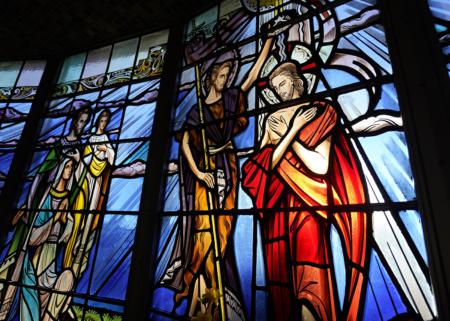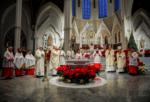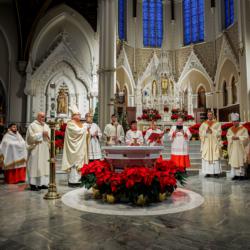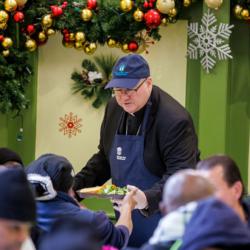Maryland Catholic school's aquaponics lab unites science, faith and fun
CUMBERLAND, Md. (OSV News) -- As Michael "Mick" Burkett proudly hoisted a large tray of Bibb lettuce plants from a shallow pool of clear water, blue tilapia darted in ever-changing directions inside a nearby fish tank.
The bright green plants at Bishop Walsh School in Cumberland in western Maryland owe their existence to the fish, drawing nutrients for their growth from the cold-blooded vertebrates' waste.
There's no soil around -- only fish, water, plants and a system of overhead lighting, all fastidiously tended by students at western Maryland's only pre-K-12 Catholic school.
"What you can't see are the bacteria -- and those are really the stars of the show," Burkett, chairman of Bishop Walsh's science department, told Catholic Review, the news outlet of the Archdiocese of Baltimore. "The bacteria take the waste from the fish and they put it into a usable form for the plants that take up those nutrients, with the water going back to the fish cleaner than when it left."
The end results are rows and rows of thriving vegetable plants that students harvest for use in the school cafeteria, to sell to members of the school community and to help feed people who are hungry at the Union Rescue Mission in downtown Cumberland.
Eventually, students hope to sell their produce -- lettuce, peas and more -- to nearby restaurants. As for the fish? As they grow and are replaced by younger upstarts, they may eventually become the main course for Lenten fish fries or be turned into fish tacos.Now in its second year, the aquaponics lab at Bishop Walsh School helps students learn science in what school leaders said is a fun and dynamic way.
Burkett's brainchild was built last school year at a cost of about $25,000. In recent years, the school used a ZipGrow Tower for hydroponic farming (water-based agriculture without fish) and erected an outdoor greenhouse to give students experience in agribusiness. Building a full-scale center for aquaponics was the next step, said Burkett, noting that the aquaponics lab has 39 fish in one large tank and another four in a smaller display tank.The hydroponics, aquaponics and greenhouse activities are coordinated through two extracurricular clubs: BWGrows for highschoolers and BWGrows Jr. for middle schoolers. Related lessons also are provided to students of all ages through science classes.
The aquaponics program has received generous support from donors, Burkett said, and one contributor has pledged $500 for a student research project in the field.
Joseph Khachan, a 12-year-old seventh grader, said he and other students test pH levels, plant seeds, feed fish and keep track of the growth of the plants in the lab."We really have to work together as a team to get things done," he told Catholic Review. "You have to get your hands involved in everything. It's not your typical class where you just sit in a chair and they teach you things."Joseph said a commitment to the aquaponics program can be time-consuming, but rewarding. He is glad some of the food he produces helps people at the Union Rescue Mission."It makes you feel like you're part of the community and that your work is going to a good cause," he said.Ella Riley, a 14-year-old eighth grader, said she has grown in her knowledge of biology and chemistry through aquaponics."The challenge is keeping up with it," she told Catholic Review. "There is someone working on it every day -- keeping up with the maintenance, the daily pH levels and harvesting. If one thing goes wrong, your entire system can fail."
Ella has enjoyed some of the lettuce she helped produce."I had some on my sandwich," she said. "It has a fresher, cleaner taste than what you get in the grocery store. It's more crisp."Burkett said the produce is high-quality."There are no insecticides, no pesticides and the nutrients in the water are extremely high," he said. "So it's about as nutritionally complete as it can be."The teacher hopes the program continues to expand. It is already raising Bishop Walsh's profile in western Maryland."Who knows where this thing will go?" he wondered.
- - - George P. Matysek Jr. is managing editor of the Catholic Review, the news outlet of the Archdiocese of Baltimore.


















